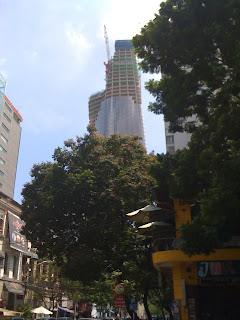We live one mile from the United States Consulate in Ho Chi Minh City. The new Consulate was built on the ground where the US Embassy stood thirty-five years ago, and on this day thirty-five years ago NVA troops were pouring into the city and US helicopters were running a last desperate shuttle between the Embassy grounds and ships of the Seventh Fleet carrying US citizens and loyal Vietnamese nationals away to safety. It was the end of the “American War,” the end of a divided Vietnam, and the beginning of the Vietnamese diaspora – the displacement and dispersal of more than 2 million Vietnamese across the world.
After the war the US embargoed Vietnam and the victorious North Vietnamese confiscated all the private property in South Vietnam and built “re-education” camps to enlighten its newly unified countrymen in the South. I’ve met people whose family members spent 7 years in re-education camps. There is still friction between the North and South over the camps, and South Vietnamese that didn’t escape in the last days of the war resorted to desperate escape strategies on overloaded, unseaworthy vessels or arduous treks across borders to find refuge.
Vietnam today is modernizing at a remarkable rate. There is an emerging middle class and some have established great wealth, but for more than 15 years after the war the country was desperate and impoverished. The change began in 1989 when the government made the decision to accept private investment and allow a flow of market products and services. Today Vietnam’s economy is thriving even though there are still large pockets of poverty.
April 30 is Vietnam’s Fourth of July – Liberation Day. It’s huge – parades, fireworks, political posturing, red and yellow banners on every tree and the red Vietnamese flag with the big yellow star flying from every house, including ours. It’s a four day holiday that includes May Day. Thirty five years after the fall of Saigon the old Embassy buildings are gone. Fifteen years ago the US and the Socialist Republic of Vietnam resumed diplomatic relations. Vietnam returned the property where the US Embassy stood and a new Consulate was erected. We went to a lawn party there recently and the Consul General addressed the mixed group of global citizens in perfect Vietnamese.
But tonight we decided to have our own party. We went to a new Mexican restaurant where we drank Margaritas with chips and salsa and got an early start on Cinco de Mayo. After all, Liberation Day isn’t really our holiday.
































